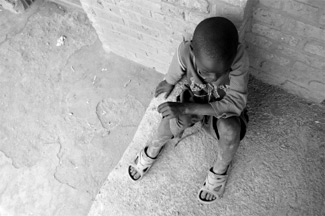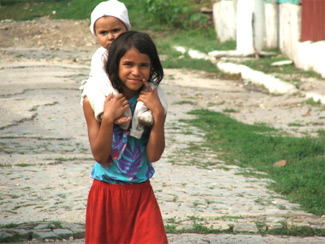|
|
I was standing in the courtroom being tried for something I did not do. As I looked around, I desperately wanted to tell everyone who would listen that I was innocent of the charges against me. However, in that moment of desperation, I realized no one seemed to care enough to listen. I was no longer a person; I was the accused. I could have been a number and it would not have mattered. It seemed that no one person would determine my future—it was the “system” that would decide. It was all so dehumanizing and so hopeless.
That day in the courtroom I had the most helpless feeling I have ever had, yet I was not as helpless as many are in this world. I had resources, friends who believed in me and a good legal team. My thoughts quickly went to the poor of this world. I wondered if my feelings were close to the desperation that many of the poor feel.
Who cares for the least, the vulnerable and the needy? Who cares for approximately half of the world’s population that could, in some sense, be referred to as poor? Who cares for the one billion people who are the poorest of the poor? Thankfully, many are developing a growing concern; sadly, most remain indifferent.
Up to that ominous day in court, my concerns for the poor revolved around a paternalistic attitude and a judgmental spirit. I grew up in a family that had very little materially. We worked hard and had every intention of doing better, and we did. I believed most of the poor were in the same situation as my family but lacked the determination to do much about their situation. They needed our generosity I thought, but it was their responsibility to get themselves out of their own mess.
Our world is not very sympathetic to the needs of the poor. Genocide, disease, cycles of poverty, social injustice and natural disasters all contribute to poverty. Some poverty is caused by a lack of responsibility, but far more is caused by circumstances beyond the victim’s control.
The “systems” of the world often treat the poor as less than human. In a best-case scenario, they are treated as creatures who need our paternalistic help; in a worst-case situation, the poor are treated as something to be ignored or persecuted. Rarely are they treated with dignity and worth. ![]()
Our Lord and “the Least of These”
The Kingdom of God offers a very different perspective on those in need. God’s heart is on the side of “the least of these” (Matthew 25:45). In most cases, we know the address or location of where Jesus would show up if he came to our city. In Isaiah 60:22, the Kingdom of God is described as making certain that “the least one will become a thousand and the smallest one a mighty nation.” Hannah prayed in 1 Samuel 2:8, “He raises the poor from the dust and lifts the needy from the ash heap; he seats them with princes and has them inherit a throne of honor.”
|
|
A central component of the mission of the Messiah is “to bring good news to the poor.” God comes down and sees the misery of his people and rescues them (Exodus 3:7-8). The Psalmist points us to what God is like when he says, “My whole being will exclaim, ‘Who is like you, O Lord? You rescue the poor from those too strong for them, the poor and needy from those who rob them’” (Psalm 35:10). Hundreds of other passages point us to the clear fact that God’s heart is full of compassion and love for the poor. He treats the poor and needy with marvelous dignity and respect.
But, God goes much further in his love for the poor than merely loving them and attempting to lift them up. God in Jesus Christ became poor for us: “For you know the grace of our Lord Jesus Christ, that though he was rich, yet for your sake he became poor so that you through his poverty might become rich” (2 Corinthians 8:9). Jesus’ poverty must not be spiritualized. He became poor for us so that we might live! The Word became flesh and “tabernacled” among us (John 1:14). In The Message, Eugene Petersen translates this passage by saying, “He moved into the neighborhood.”
Our Calling to “the Least of These”
God’s kingdom, like all kingdoms, has a culture. In his kingdom culture, the mind and heart of God reigns supreme. Paul tells us that as his kingdom citizens, we are to take on the mind of Christ “by being of the same mind, maintaining the same love, united in spirit, intent on one purpose” (Philippians 2:2). We are called to take on the heart of God and this includes his love for the poor.
Jesus tells us in John 20:21, “Peace be unto you, as the Father has sent me, I also am sending you.” We are not only to take on the mind of Christ, but we are to minister as he ministered. This certainly involves his incredible passion for the poor and needy.
When we appear before Christ, one of the primary topics of concern will be how his people fed the hungry, how we gave the thirsty a drink and clothed the poor (Matthew 25:34-40). He says, “To the extent that you did it to the least of these brothers of mine, even the least of these, you did it to me” (Matthew 25:40). When we are full of God’s Spirit, we will naturally develop a concern for the poor and needy. In some cases, we will have such a heart of compassion for those in need that we will not even be aware of how we have served the needs of others. ![]()
Our Presence with “the Least of These”
From that day in the courtroom, God has continued to cultivate in me and my wife a passion for the poor. It is true that the poor feel helpless and hopeless. It is also true that many have no resources or capacity to improve their situation without God’s love being poured out on their entire lives. Yes, we must never diminish the central need of the saving power of the cross and resurrection life. But, we must also remember that the fullness of the gospel is the transforming power that ultimately includes all aspects of life. This journey begins with loving friends to help in painful circumstances just as we had when we went to trial.
The more we are among the poor, the more we love the poor. For most of God’s people, developing a heart for the poor is cultivated by being among the poor. When Jesus “saw the multitudes, he felt compassion for them because they were harassed and helpless like sheep without a shepherd” (Matthew 9:36). When we see people as they really are, not as they seem, we begin to feel the compassion of God for them.
Some weeks ago I spent some time with a homeless man named Ron. As we talked, he shared insights with me into his world and his perspective on the deceitfulness of riches. Our interaction included sophisticated technology and complex social systems. As I listened to him, I saw some of the beauty of God in his understanding of spiritual realities and the problem of the material dream. I also saw how the bondage of sin gripped him. I felt tremendous compassion for him as we talked. Jesus came to give Ron “good news” filled with help and hope. Ron is not beyond the reach of the gospel.
My prayer is that most of God’s people will not have to experience a day in court to discover the pain and hopelessness of the poor. One of the tragedies of the Body of Christ is that many have justified their lack of involvement with the poor by simply saying, “I’m not called to serve the poor.” Let me suggest that we are all called to serve among the poor in some way. It is in the very DNA of the Kingdom of God. We are never justified in ignoring the needs of the “the least of these.”
I encourage and even challenge you to go and be among those in need. Enter into the world of the poor and discover that the Kingdom of God begins with “the least of these.” Jesus is already there!



